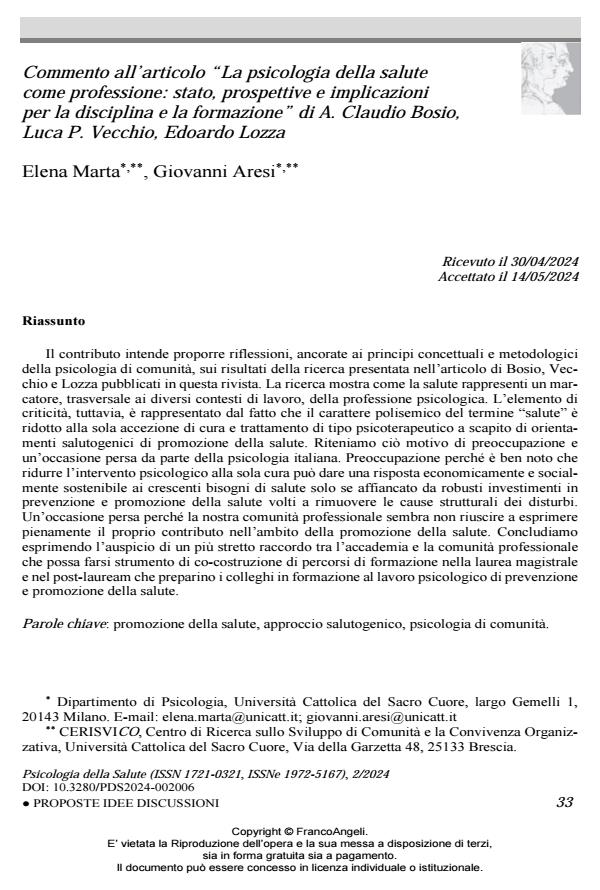Comment on the article “Health psychology as a profession: status, perspectives and implications for the discipline and training” by A. Claudio Bosio, Luca P. Vecchio, Edoardo Lozza
Journal title PSICOLOGIA DELLA SALUTE
Author/s Elena Marta, Giovanni Aresi
Publishing Year 2024 Issue 2024/2
Language Italian Pages 5 P. 33-37 File size 196 KB
DOI 10.3280/PDS2024-002006
DOI is like a bar code for intellectual property: to have more infomation
click here
Below, you can see the article first page
If you want to buy this article in PDF format, you can do it, following the instructions to buy download credits

FrancoAngeli is member of Publishers International Linking Association, Inc (PILA), a not-for-profit association which run the CrossRef service enabling links to and from online scholarly content.
The aim of this paper is to propose a reflection, based on the conceptual and methodologi-cal principles of community psychology, on the results of the research presented in the article by Bosio, Vecchio and Lozza published in this journal. The research shows how health repre-sents a corner stone, transversal to different work contexts, of the psychological profession. The critical element, however, is that the polysemic character of the term “health” is reduced to the sole meaning of psychotherapeutic care and treatment, to the detriment of salutogenic ori-entations of health promotion. We consider this a cause for concern and a missed opportunity for Italian psychology. Concern, because it is well known that the offer of psychological treatment interventions can only be an economically and socially sustainable response to grow-ing health needs if it is accompanied by robust investments in prevention and health promotion aimed at eliminating the structural causes of disorders. A missed opportunity because our pro-fessional community does not seem to be able to fully express its contribution in the field of health promotion. We conclude by expressing our hope for a closer link between the academy and the professional community, which can become a tool for co-creating master’s and post-graduate training courses that prepare colleagues in training for the psychological work of pre-vention and health promotion.
Keywords: health promotion, salutogenic approach, community psychology.
Elena Marta, Giovanni Aresi, Commento all’articolo “La psicologia della salute come professione: stato, prospettive e implicazioni per la disciplina e la formazione” di A. Claudio Bosio, Luca P. Vecchio, Edoardo Lozza in "PSICOLOGIA DELLA SALUTE" 2/2024, pp 33-37, DOI: 10.3280/PDS2024-002006